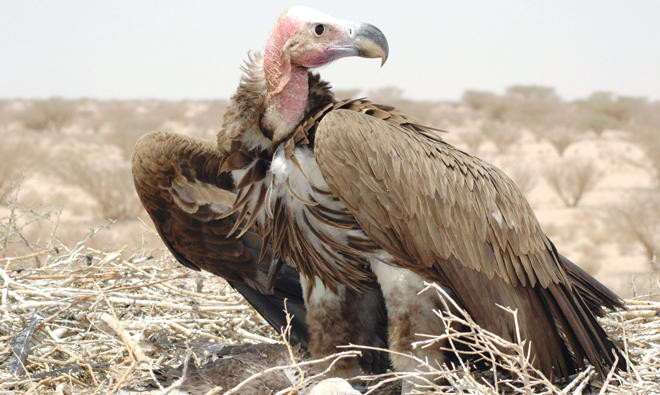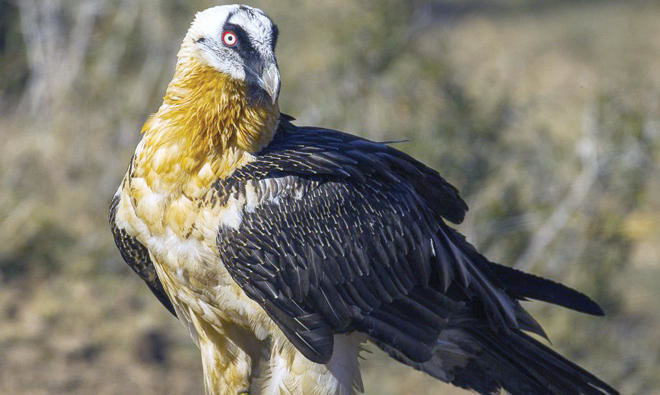RIYADH: Scientific studies by researchers from the Saudi Wildlife Authority (SWA) show that a huge number of vulture deaths are a result of poisoning, which will eventually threaten the wildlife ecological balance.
In a study on how vultures are facing threats, Dr. Mohammed Shobrak from the SWA in Taif said that vultures were one of the most threatened families of birds in the world and their decline had been shockingly rapid.
Some species in Africa and the Indian subcontinent have declined by more than 95 percent in the past few decades, a rate faster than that of the passenger pigeon or the dodo.
The biggest driver of these declines is human impact, either by poisoning (intentional or otherwise) or from maltreatment. As a result many Old World, vultures are now critically endangered, meaning they are at risk of becoming extinct in our lifetime.
Shobrak said vultures were efficient scavengers vital in preventing the spread of disease — locating and picking clean carcasses before disease spores could develop — and that their demise would lead to economic, social and environmental problems.
In Saudi Arabia, studies by SWA researchers indicate that many vulture deaths are a result of poisoning.
Another reason for the deterioration in vulture numbers in the Kingdom and other parts of the world is pesticide spraying.
Vultures, despite their stomach’s ability to digest the tissue of an animal that has died as a result of viral or bacterial diseases, are vulnerable to toxic chemicals used in insect eradication.
Shobrak said that deaths of Griffon vultures have been recorded in Saudi Arabia in regions where pesticides are used to control populations of the desert locust.
“Other causes of deterioration are disturbances to nesting sites, especially those that nest in trees, like the lappet-faced vulture,” he said.
Nesting disturbances can affect the reproduction of these birds and may lead to a decrease in their numbers.
Another threat is poorly planned powerlines, wind farms and roads, which result in the deaths of thousands of vultures across Europe and Asia every year.
An SWA official told Arab News that vultures played an important role in cleansing the forests of dead animals, and their absence could lead to other problems in the environment and difficulty in maintaining the ecological balance in the wild.
He said that the SWA had been taking preventive measures to fight the decline of the birds through awareness programs, and by providing protected areas where they would not face human impact.
Saudi Wildlife Authority: Vulture population threatened by human impact
Saudi Wildlife Authority: Vulture population threatened by human impact

KAUST conducts research study on microbiomes in glacier-fed streams

- Collaboration with scientists from Swiss Federal Technology Institute of Lausanne
RIYADH: The King Abdullah University of Science and Technology, in collaboration with scientists from the Swiss Federal Technology Institute of Lausanne, has conducted an unprecedented, in-depth study on microbiomes — microorganisms that live symbiotically with humans or other organisms — in glacier-fed streams.
These streams, originating from glaciers atop the Earth’s highest mountains, harbor a wealth of unique microorganisms.
The research team collected and analyzed samples from 170 glacier-fed streams over five years across regions including New Zealand, the Himalayas, the Russian Caucasus, the Tien Shan and Pamir Mountains, the European Alps, the Scandinavian Alps, Greenland, Alaska, the Rwenzori Mountains in Uganda, and the Ecuadorian and Chilean Andes, the Saudi Press Agency reported.
The findings, published in the renowned scientific journal Nature, represent the first global reference for microbiomes in glacier-fed streams.
These streams, which are among the most extreme natural freshwater ecosystems in the world, are located at mountain summits and are characterized by near-freezing temperatures and low nutrient levels.
They also serve as the origin for many of the world’s largest rivers, functioning as vital water reservoirs for the planet.
KAUST researcher Dr. Ramona Marasco emphasized that glacier-fed streams were highly vulnerable to climate change.
She spoke of the importance of establishing a baseline for their microbiomes to better understand the rate of ecological change, while highlighting KAUST’s extensive genetic sequencing efforts, which have significantly contributed to creating a comprehensive picture of these endangered microbiomes.
The researchers successfully developed the first global atlas of microorganisms in glacier-fed streams.
Their work revealed that these streams harbor a unique microbiome distinct from other cryospheric systems, such as glaciers, frozen soils, and ice-covered lakes.
About half of the bacterial species in these streams are endemic to specific mountain ranges. The scientists attribute this phenomenon to the geographical isolation of mountain ranges, similar to islands, and to the powerful natural selection exerted by the harsh conditions in glacier-fed streams.
Saudi swimmer’s remarkable 30km swim from Alkhobar to Bahrain

- Mariam Binladen’s feat of endurance and grit completed in over 11 hours
JEDDAH: In a remarkable feat of endurance and determination, Saudi Arabia’s Dr. Mariam Binladen recently completed the Khalid bin Hamad Swimming Challenge, covering a distance of 30km from Alkhobar, Saudi Arabia, to Salman City, Bahrain.
Binladen achieved this incredible feat in 11 hours, 25 minutes and 47 seconds.
Among her achievements, the open-water swimmer became the first Arab woman to cross the Red Sea to Egypt in October 2022, and the first to traverse Dubai Creek with a swim of 24 km in 2017.
In addition, she was the first woman from the Gulf to swim across the English Channel, covering 33.5 km in August 2016.
Speaking to Arab News about her feat on Dec. 26, Binladen said: “This swim was on my radar for 7 years.

“Unfortunately it was difficult to find an optimum window to do the challenge, primarily because weather conditions in the Gulf of Bahrain are incredibly difficult to predict.
“I had to study the sea very well taking into account the tides, wind speed, wave patterns, swells, water temperature and marine life cycles in order to minimize risk and achieve this goal.”
She added: “Amongst the many challenges of this event was swimming at night in the dark, in fluctuating cold-to-warm water temperatures, with the added complexity of tidal changes.
“As a way of mitigating the hazardous conditions the swim started at the Water Tower at Alkhobar at 1:50 a.m. Visibility was zero so I was swimming blind coupled with water temperatures ranging from 17 to 22 degrees.
“Instead of feeding every 30 minutes I fed every 15 minutes to avoid hypothermia and to maintain my body heat until sunrise, which was half-way through the swim.
“The tide in this area shifts every six hours which meant swimming part of the way against the tide which requires a huge amount of stamina and mental agility in order not to become exhausted.”
She added: “Each challenge poses its own distinct difficulties and unique set of conditions; during the Red Sea swim it was how to maneuver around sharks and avoid their feeding times.
“The English Channel, for example, was freezing cold and it is a busy shipping lane so it was necessary to address those concerns and plan accordingly.
“The Bahrain swim was undoubtedly hazardous and posed many issues, the distance being one of them. Before any swim I undertake area studies, conditions, risks and train to mitigate risks and for the conditions that I will face. Of course there are always some surprises.”

She has faced other challenges during her career. “My most unusual swim was in an ice glacier in Switzerland, this challenge was to swim in (minus) 2 degrees for 85 meters.
“I undertook extensive physical and cognitive training in order to prepare for this unique challenge. The burn of the ice-cold water will remain with me forever.”
In addition to being an athlete and dentist, Binladen also helps refugees and creates awareness through her platform, which has been acknowledged by organizations worldwide.
In 2016, she opened the first free medical facility of its kind for dental treatment in a Syrian refugee camp in Azraq, Jordan.
“Of course it is rewarding to treat any patients, I love to help people in any capacity I can, whether through treatment, inspiring them in sport or supporting them to swim gives me enormous satisfaction.”
As the Kingdom empowers women, Binladen said that she is delighted to be living at a time when Saudi women can pursue their ambitions in the workplace, sports and business.
“My advice to Saudi women is to never give up on your dream, with hard work and dedication you can fulfill your goals.”
On her future, she said: “It’s a common question, everybody is interested to know what’s next. All I can say is that I have a few possibilities in the pipeline and am carrying out area studies at the moment.”
“My ambition is to lead a fulfilling life in which I am constantly learning, developing, growing and making a positive impact on those around me, through my career, relationships or personal endeavors.
“I strive to pursue excellence and leave a lasting legacy that inspires others.”
Authority warns against overuse of ginseng by pregnant women, says no proof of safety

- Adverse effects of the plant-based supplement include insomnia or high blood pressure when used in large doses, warns SFDA
- It stressed that stressed that herbal supplements should be used with caution, like any other medicine
RIYADH: The Saudi Food and Drug Authority has warned against overuse of the herb ginseng due to possible negative side-effects and the lack of evidence of its safety for pregnant and breastfeeding women.
Adverse effects of the plant-based supplement include insomnia or high blood pressure when used in large doses, and the SFDA warned that there was no proof of it being safe to use during pregnancy, according to the Saudi Press Agency.
In addition, the herb may interfere with medicines for blood thinners, diabetes, heart conditions, insomnia and schizophrenia, and can interact negatively with caffeine, it said.
Ginseng, known by its scientific name Panax ginseng, is used in alternative medicine for its purported effects on energy levels, concentration and mood.
The recommended average dose is between one and two grams of the root, taken three to four times a day, for between three and four weeks, according to the report.
SFDA further stressed that herbal supplements should be used with caution, like any other medicine.
It added that claims about the safety of such supplements not supported by evidence should be handled with caution, and advised consulting a doctor before using them.
Herbal supplements can also interfere with certain foods, as well as medication, the authority added.
SFDA provides a list of prohibited medicinal plants and cosmetic products on its official website: https://www.sfda.gov.sa/ar/informationlist/66327.
KACST graduates 46 deep-tech startups from Venture Program

- Scheme turns research into marketable products
- Energy, healthcare, renewables sectors represented
RIYADH: Forty-six deep-tech startups graduated from the King Abdulaziz City for Science and Technology’s Venture Program in a recent ceremony.
The graduating startups come from a diverse range of sectors, including energy, healthcare, renewable resources and emerging technologies.
Notable participants included Glass Earth KSA, which specializes in geospatial technology solutions for environmental monitoring; PainTech Solutions, a company developing innovative approaches to pain management and medical treatments; and EA Systems, focused on advanced engineering solutions for industrial automation and efficiency.
The KACST Venture Program is an initiative designed to support deep-tech startups by providing resources, mentorship, and strategic partnerships to transform research into marketable products and services.
The program was supported by the National Technology Development Program, which also granted technology licenses to a number of private sector firms.
Held at KACST’s The Garage startup incubator in Riyadh, the graduation ceremony brought together key stakeholders, including government officials, researchers and private investors.
Among the dignitaries in attendance was Munir El-Desouki, president of KACST, who praised the initiative’s role in advancing Saudi Arabia’s economic transformation.
Khalid Al-Dakkan, senior vice president of innovation at KACST, said: “At KACST, we worked to connect emerging companies with the government and private sectors, and investors to develop ideas and innovations, and transform them into marketable products and services to support the national economy.”
Al-Dakkan also pointed to the inclusion of strategic partners in the program’s next phase. “The KVP program, in its new version, includes the inclusion of a number of strategic partners to strengthen the innovation system and support the economy,” he said.
The new iteration will involve partnerships with four Saudi universities to foster a vibrant entrepreneurial culture while targeting fields such as clean energy, artificial intelligence and health technologies.
Ibrahim Neyaz, CEO of NTDP, underscored the program’s importance in driving growth in emerging sectors.
“The KACST program for creating emerging companies aims to support and empower owners of innovative technology projects and encourage national companies to invest in emerging technologies to raise their share in the local market, and provide initiatives that help in developing technologies,” he said.
Saudi Arabia’s King Salman receives written message from Senegal president

- The message related to Saudi-Senegalese relations, and was received by the Kingdom’s Foreign Minister Prince Faisal bin Farhan
RIYADH: Saudi Arabia’s King Salman received a written message from the President of Senegal Bassirou Diomaye Faye, the Saudi Press Agency reported on Thursday.
The message related to Saudi-Senegalese relations, and was received by the Kingdom’s Foreign Minister Prince Faisal bin Farhan during a meeting with Senegal’s Minister of Armed Forces Gen. Birame Diop in Riyadh.
During the meeting, Prince Faisal and Diop discussed topics of common interest and ways to enhance relations between their countries.






















